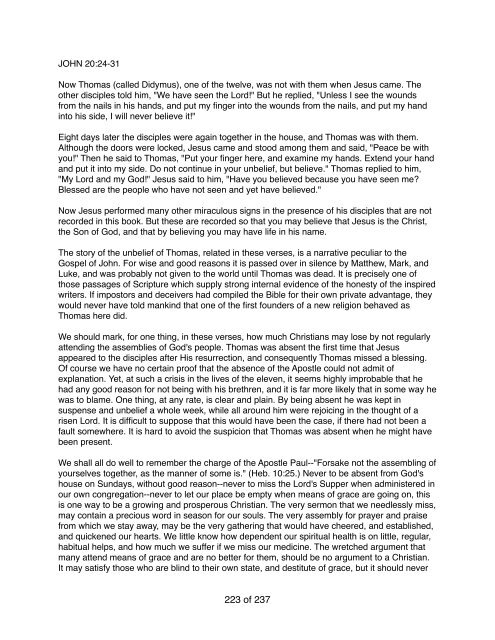J. C. Ryle John
John Charles Ryle (May 10, 1816 - June 10, 1900) was an evangelical Anglican clergyman and first Bishop of Liverpool. He was renowned for his powerful preaching and extensive tracts.
John Charles Ryle (May 10, 1816 - June 10, 1900) was an evangelical Anglican clergyman and first Bishop of Liverpool. He was renowned for his powerful preaching and extensive tracts.
You also want an ePaper? Increase the reach of your titles
YUMPU automatically turns print PDFs into web optimized ePapers that Google loves.
JOHN 20:24-31<br />
Now Thomas (called Didymus), one of the twelve, was not with them when Jesus came. The<br />
other disciples told him, "We have seen the Lord!" But he replied, "Unless I see the wounds<br />
from the nails in his hands, and put my finger into the wounds from the nails, and put my hand<br />
into his side, I will never believe it!"<br />
Eight days later the disciples were again together in the house, and Thomas was with them.<br />
Although the doors were locked, Jesus came and stood among them and said, "Peace be with<br />
you!" Then he said to Thomas, "Put your finger here, and examine my hands. Extend your hand<br />
and put it into my side. Do not continue in your unbelief, but believe." Thomas replied to him,<br />
"My Lord and my God!" Jesus said to him, "Have you believed because you have seen me?<br />
Blessed are the people who have not seen and yet have believed."<br />
Now Jesus performed many other miraculous signs in the presence of his disciples that are not<br />
recorded in this book. But these are recorded so that you may believe that Jesus is the Christ,<br />
the Son of God, and that by believing you may have life in his name.<br />
The story of the unbelief of Thomas, related in these verses, is a narrative peculiar to the<br />
Gospel of <strong>John</strong>. For wise and good reasons it is passed over in silence by Matthew, Mark, and<br />
Luke, and was probably not given to the world until Thomas was dead. It is precisely one of<br />
those passages of Scripture which supply strong internal evidence of the honesty of the inspired<br />
writers. If impostors and deceivers had compiled the Bible for their own private advantage, they<br />
would never have told mankind that one of the first founders of a new religion behaved as<br />
Thomas here did.<br />
We should mark, for one thing, in these verses, how much Christians may lose by not regularly<br />
attending the assemblies of God's people. Thomas was absent the first time that Jesus<br />
appeared to the disciples after His resurrection, and consequently Thomas missed a blessing.<br />
Of course we have no certain proof that the absence of the Apostle could not admit of<br />
explanation. Yet, at such a crisis in the lives of the eleven, it seems highly improbable that he<br />
had any good reason for not being with his brethren, and it is far more likely that in some way he<br />
was to blame. One thing, at any rate, is clear and plain. By being absent he was kept in<br />
suspense and unbelief a whole week, while all around him were rejoicing in the thought of a<br />
risen Lord. It is difficult to suppose that this would have been the case, if there had not been a<br />
fault somewhere. It is hard to avoid the suspicion that Thomas was absent when he might have<br />
been present.<br />
We shall all do well to remember the charge of the Apostle Paul--"Forsake not the assembling of<br />
yourselves together, as the manner of some is." (Heb. 10:25.) Never to be absent from God's<br />
house on Sundays, without good reason--never to miss the Lord's Supper when administered in<br />
our own congregation--never to let our place be empty when means of grace are going on, this<br />
is one way to be a growing and prosperous Christian. The very sermon that we needlessly miss,<br />
may contain a precious word in season for our souls. The very assembly for prayer and praise<br />
from which we stay away, may be the very gathering that would have cheered, and established,<br />
and quickened our hearts. We little know how dependent our spiritual health is on little, regular,<br />
habitual helps, and how much we suffer if we miss our medicine. The wretched argument that<br />
many attend means of grace and are no better for them, should be no argument to a Christian.<br />
It may satisfy those who are blind to their own state, and destitute of grace, but it should never<br />
223 of 237




